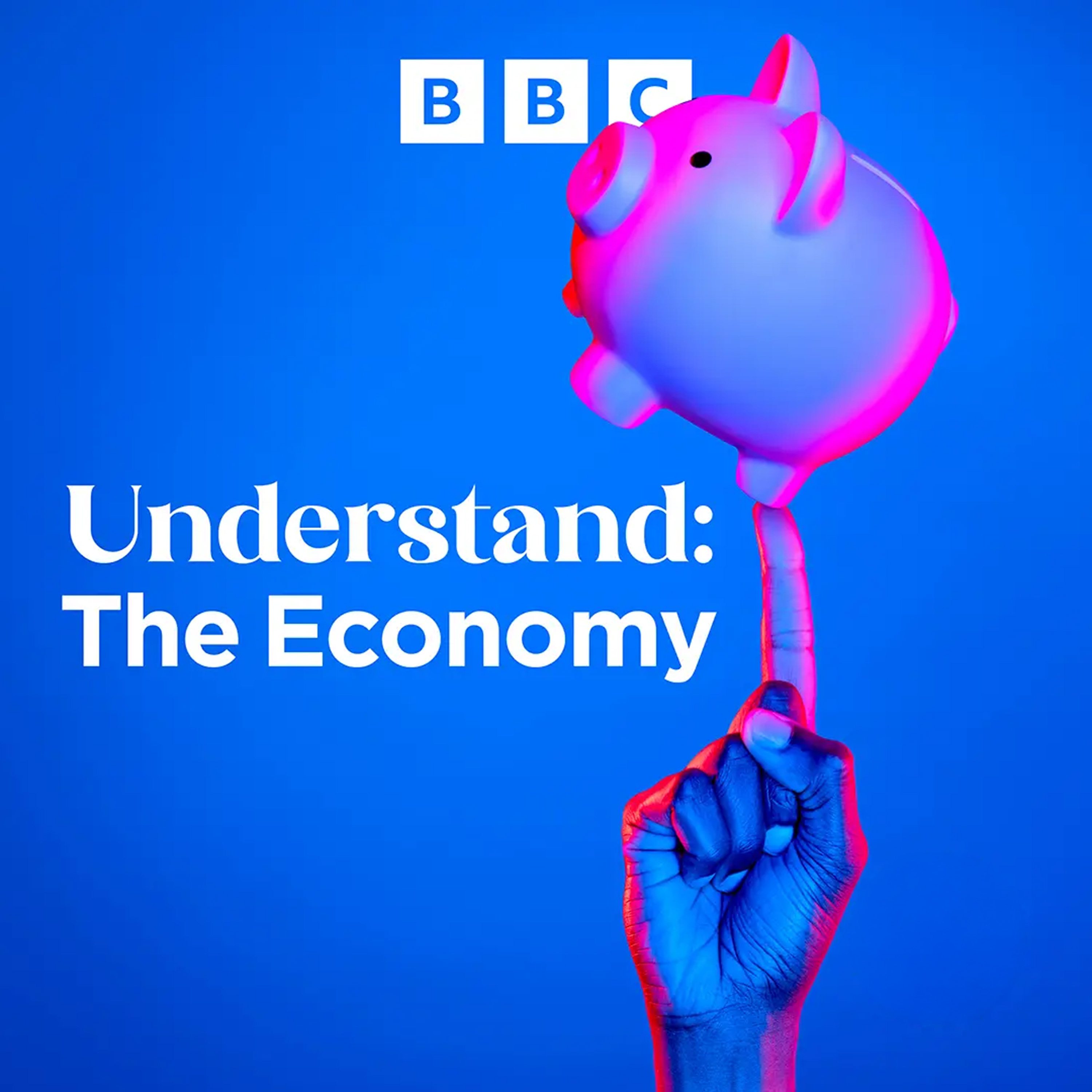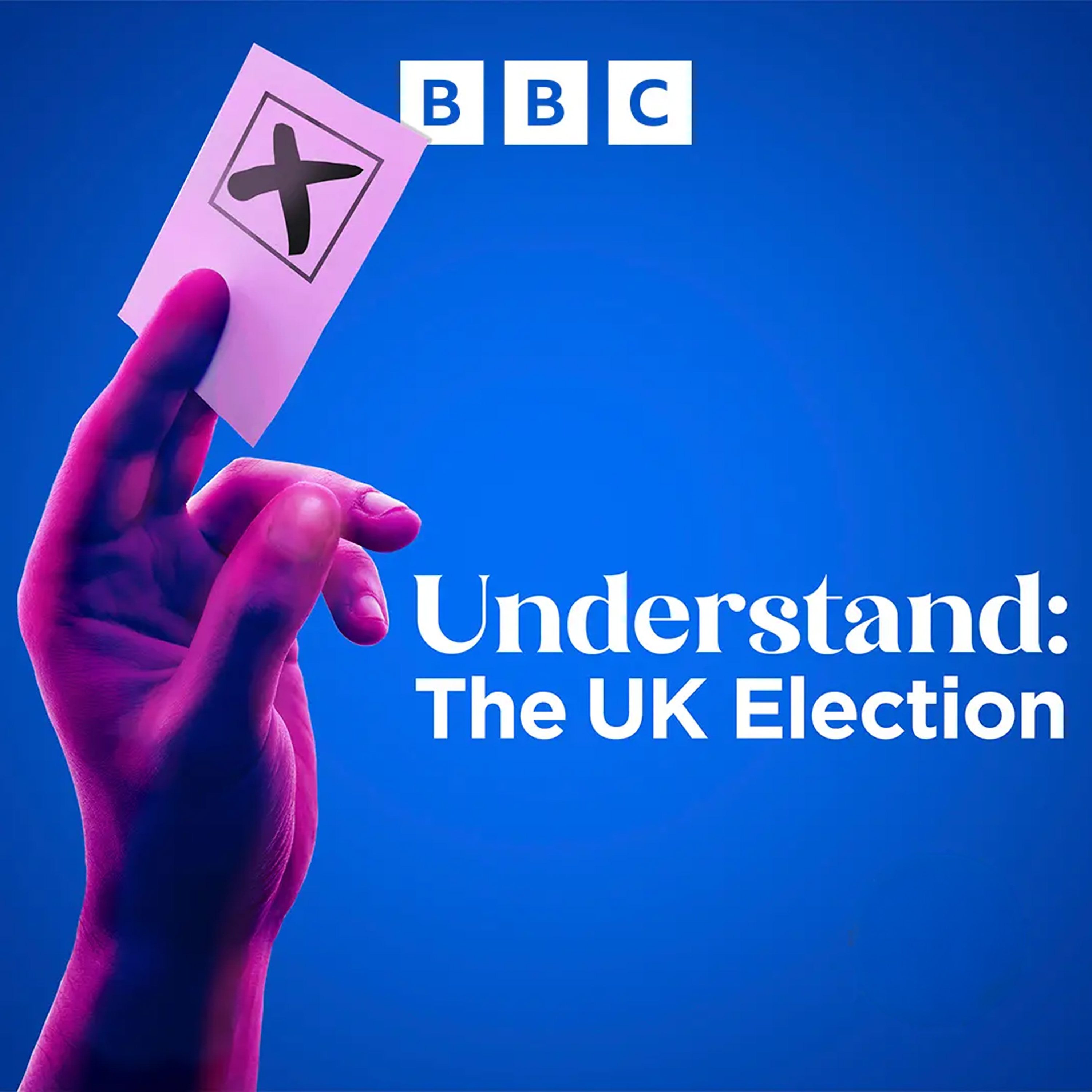The Economy: 6. Recessions
What is a recession and what causes a recession? Whether something suddenly makes you poorer or just makes you worry about becoming poorer, when you cut your spending in the shops, this affects other people and ripples through the economy. Tim Harford explains the role a government can play in pulling a country out of a recession and Cambridge University Economic Historian Victoria Bateman tells the story of one of our longest recessions that started in 1921.
Everything you need to know about the economy and what it means for you. This podcast will cut through the jargon to bring you clarity and ensure you finally understand all those complicated terms and phrases you hear on the news. Inflation, GDP, Interest rates, and bonds, Tim Harford and friends explain them all. We’ll ensure you understand what’s going on today, why your shopping is getting more expensive or why your pay doesn’t cover your bills. We’ll also bring you surprising histories, from the war-hungry kings who have shaped how things are counted today to the greedy merchants flooding Spain with silver coins. So if your eyes usually glaze over when someone says ‘cutting taxes stimulates growth’, fear no more, we’ve got you covered.
Guest: Professor Richard Davies, University of Bristol
Producer: Phoebe Keane
Researcher: Drew Hyndman
Editor: Clare Fordham
Theme music: Don’t Fret, Beats Fresh Music
A BBC Long Form Audio Production for BBC Radio 4
Press play and read along
Transcript
Speaker 1 This BBC podcast is supported by ads outside the UK.
Speaker 1 At the BBC, we go further so you see clearer. Through frontline reporting, global stories, and local insights, we bring you closer to the world's news as it happens.
Speaker 1 And it starts with a subscription to bbc.com, giving you unlimited articles and videos, ad-free podcasts, and the BBC News Channel streaming live 24-7.
Speaker 1 Subscribe to Trusted Independent Journalism from the BBC.
Speaker 1 Find out more at bbc.com slash join.
Speaker 2
Suffs, the new musical has made Tony award-winning history on Broadway. We the man to be home.
Winner, best score.
Speaker 3 We the man to be seen.
Speaker 2
Winner, best book. We the man to be quality.
It's a theatrical masterpiece that's thrilling, inspiring, dazzlingly entertaining, and unquestionably the most emotionally stirring musical this season.
Speaker 2 Suffs, playing the Orpheum Theater, October 22nd through November 9th. Tickets at BroadwaySF.com.
Speaker 4 Welcome to Understand the Economy, the podcast that takes you back to basics to explain how economics affects our everyday lives.
Speaker 4
You can take it from me as the undercover economist that nobody pays much attention to the economy unless something's going wrong. And that usually means a recession.
Funny word recession?
Speaker 4
Pro-cessions are supposed to be fun, or at least a grand spectacle. Marching bands, uniforms, maybe even a carnival float if you're lucky.
But recessions, what even are they?
Speaker 4 Well, just as processions usually move forward, economies usually grow, as you will know if you listen to episode three of this show. Still available on BBC Sounds, of course.
Speaker 4 And a recession is the opposite, the economy getting smaller. And just as if everyone in a pro-cession started trying to walk backwards for a bit, the result is a bit of a miserable mess.
Speaker 4 To help me get my thinking straight and my eyes forward, here's Richard Davis again.
Speaker 4 Richard is an economics professor at Bristol University, director of the UK's Economics Observatory, co-director of the Bristol Festival of Economics, and the author of Extreme Economies.
Speaker 4 Hello, Richard.
Speaker 3 Hi, Tim.
Speaker 4
Let's start with the definition of a recession. I see different sorts of definitions floating around.
Is there an official definition?
Speaker 3
Yes, there is a technical definition of a recession. And it's when an economy goes through two consecutive quarters of negative growth.
That just means it shrinks.
Speaker 3 So we can measure our economic statistics by the month, by the year, and so on. But very often they're measured by the quarter, by sort of groups of three months, so January to March and so on.
Speaker 3 And when you have two of those quarters, back-to-back, in which an economy, the overall size of it goes down, that's the official definition of a recession.
Speaker 4 So, why do recessions happen?
Speaker 3 Well, a good way to start thinking about it is to think about what are we talking about.
Speaker 3 So, we're talking about the overall size of the economy, and what we use to measure that is GDP, so gross domestic product.
Speaker 4 GDP, we should say, is something we covered in episode three of the series, and that episode is still available on BBC Sounds. But, yes.
Speaker 3 So, who is doing the spending? And a useful rule of thumb is to say that the household sector is going to be about 60%,
Speaker 3 the government's spending is going to be around 20%,
Speaker 3 and investment in the economy is also going to be around 20%. And really, the lion's share is taken up by the household and all of the spending that it does.
Speaker 3 So, very often, when we have a recession, there's something going on with the household sector.
Speaker 4
Right. So, because more than half of the money being spent in the economy is being spent by households.
And when we say households, we're really talking about you and me, Richard.
Speaker 4 I mean people like us. Why might we stop spending money or at least spend less money and prompt a recession?
Speaker 3 Well I think there are two different types of recession to think about. And the first is when a shock hits an economy.
Speaker 3 And so often what will happen, some external factor hits an economy and it's negative news. And this can then hit asset value.
Speaker 3 So everything from the stock market to the prices of of people's houses can either go down or stop increasing in price.
Speaker 3 And what this does is people's overall level of wealth relies on both houses and the stock market.
Speaker 3 And if they see those things going down, then they're going to tend to be more, lose confidence and tend to cut back on their spending.
Speaker 3 And so everything from the amount they spend in the shops through to more luxury items, so cars or a holiday they might take in the UK, in Wales or in Cornwall, they're going to trim those back.
Speaker 3 And so spending in the economy goes down.
Speaker 4
So I'm looking at all this. I'm still earning, still got my salary, but I'm looking at all this and I'm thinking, I don't like this.
So I am not going to go on holiday in Cornwall.
Speaker 4 So what happens then?
Speaker 3 Well, what happens then is a kind of ripple effect, which is known in economic terms as the multiplier effect. So let's take this holiday in Cornwall that you've just cancelled.
Speaker 3 Well, this means that what you were going to spend, the income of the hotel, is going to go down. And the hotel manager then needs to take a decision.
Speaker 3 So what should they do on the pay, for example, of the chefs that work in the hotel?
Speaker 3 Should they upgrade the hotel and pay for the carpenter and plumber that we're going to put in place those new bathrooms? And all of those things they're going to tend to trim back.
Speaker 3 So they have the income of the plumber and the carpenter and the cook being looked at and probably going down. And then in turn, their spending is going to go down.
Speaker 3 And this is how a shock, a big big external shock, can ripple through an economy, affecting everybody. Because for one person's spending, that becomes another person's income.
Speaker 3 And it kind of cycles round, adds up in this kind of ratcheting thing that we call the multiplier effect.
Speaker 4 Now, you described the importance of confidence. Can we think ourselves into a recession just by being scared enough? Or is that not really a thing?
Speaker 3 Yes, it can be the case that bad news and just uncertainty amongst society and what people are talking about over the dinner table can lead people to pare back on their spending.
Speaker 3 So researchers have looked at this, they've gathered over time exactly what's in the headlines of newspapers and during periods where words like uncertainty, recession, crash and so on are more prevalent in a nation's press, during those periods people have been shown to cut back on their spending.
Speaker 3 And again, any time anybody cuts back on their spending, that means that the shop they were were going to spend in, the hotel that they were going to buy that weekend away from, the income of that person goes down.
Speaker 3 And then they in turn may cut back on their spending. And we're back to the ripple effect.
Speaker 4
We've been talking about confidence, but there is something else going on now. You know, we're speaking late in 2022, which is that we've got an inflation problem.
Prices are rising.
Speaker 4 Wages aren't rising as rapidly. So we basically just got, in real terms, after you take inflation inflation into account we've got less money.
Speaker 4 So could that cause a recession and is that a different process from the one you've laid out before?
Speaker 3 Yeah so I think this is the second big reason to understand why we get in a recession and it's because for a sustained period for a year two years or so the level of wages goes up at a slower rate than the level of prices.
Speaker 3 In other words, the buying power of the British worker is going down. When that happens, clearly the amount that they're going to spend is going to go down also.
Speaker 4 When we cut back on that spending, that can tip the economy into a recession. So what do we cut back on first?
Speaker 4 I seem to remember Alan Greenspan, who used to run the US Federal Reserve and therefore was one of the most powerful economic policymakers in the world.
Speaker 4 He said, didn't he, that, you know, it's bad if men have stopped buying socks and underpants. Is that right?
Speaker 3
Yeah, he did. So Greenspan, he had a range of different indicators that he looked at.
Some, of course, very formal things like industrial production.
Speaker 3
But one of them that he was said to look at was actually spending on men's undergarments, so their pants and socks. And his logic went like this.
It was that men really...
Speaker 3
don't care about those things. Now, of course, always in economics, we're making vast generalizations.
I'm sure there are plenty of men that really do care about those things.
Speaker 4 But his idea was that the average man...
Speaker 3 Probably Alan Greenspan didn't care about underpants and socks,
Speaker 3 his idea was that the average man didn't. And what this meant was that spending on those things would be incredibly stable because they were sort of staple that you kind of had to buy.
Speaker 3 And so Greenspan's logic was that if you started to see that kind of spending going down and tanking, that meant men really were facing the pinch.
Speaker 3 And it was a really good indicator, a warning light, if you will, that there was a recession coming.
Speaker 4
Time for a bit of history of one of our longest recessions. Here's Dr.
Victoria Bateman of Cambridge University.
Speaker 5 I grew up in Oldham in the north of England which had a great reputation as a cotton industrial centre
Speaker 5 but it was hit really really hard after World War I by a very deep recession and really that was the beginning of the end for Oldham's economy.
Speaker 5 So Britain emerges from World War I
Speaker 5 used to producing things like guns and tanks and now it needs to adjust back to peacetime conditions.
Speaker 5 It needs to go back to producing all the kinds of goods that it was producing before the war, such as cotton in the cotton factories of Manchester and iron and steel in places like Sheffield.
Speaker 5 And so cotton manufacturers, for example, take on big loans to try and re-equip their factories for peacetime conditions.
Speaker 5 What they don't realise is that very soon British policymakers are about to hike interest rates.
Speaker 5 And one of the reasons policymakers are trying to do this is that people are feeling happy after Britain wins the war.
Speaker 5 And they're spending a lot, and with it, prices are rising, inflation is starting to rise.
Speaker 5 And so, to try and take control of the situation, policymakers hike interest rates in an effort to try and bring spending down and to bring inflation down with it.
Speaker 5 But realistically, they overshoot, and this has terrible consequences for Britain's industries.
Speaker 5 Meanwhile, British industry was already starting to suffer because, whilst Britain was fighting the war, America began producing the types of goods that Britain was no longer producing, such as cotton textiles and selling those goods internationally to what were previously customers of Britain.
Speaker 5 And so, Lancashire cotton mills, for example, find they have far fewer customers out there in the world.
Speaker 5 So, cotton mills and factories are really struggling to pay their bills, to make those interest payments on their debt. And so, sadly, what happens is that many of these factories start to close down.
Speaker 5 That makes people unemployed to the point that unemployment across the country as a whole rises as high as about 16 percent by 1921.
Speaker 5 And that high unemployment continues for some time in those industrial regions. So by 1923, unemployment in the northwest of England is still as high as 15%,
Speaker 5 whereas in the southeast of England, it's come down to about 9%.
Speaker 5 And so this pushes the country into recession.
Speaker 4
Dr. Victoria Bateman.
Richard Davis, it's a little anxiety-producing listening to that piece of history in late 2022 because right now the Bank of England is trying to raise interest rates.
Speaker 4
Sounds very familiar. Well they are raising interest rates.
They're trying to get inflation under control. So are they trying to cause a recession just as we had a recession in the 1920s?
Speaker 3 So the Bank of England is tasked with getting inflation down to around 2%.
Speaker 3
At the moment it's way above that. And so they've raised interest rates.
The idea is exactly to get us to spend a little bit less.
Speaker 3 They're walking a tightrope at the the moment because the economy is weakening and so it looks like we are going into what will be a recession that will contribute to the slowdown in the economy.
Speaker 4 But the Bank of England isn't the only policymaker in the UK. There is also the elected government.
Speaker 4 What is the influence that government spending and government taxation has on whether an economy falls into recession and whether it can be pulled out again?
Speaker 3 In general, what economists would like to happen is imagine a seesaw. And on one end of the seesaw, you've got the household, which we've talked about.
Speaker 3 So all of their spending on their shopping, their cars, their holidays, all those things. And on the other end, you've got the government.
Speaker 3 And so the ideal situation is that as the household sector rises and falls on this seesaw, you want the government at the other end doing the opposite thing.
Speaker 3 So when households are feeling the pinch, you want the government to be confident and going out there and spending and lowering tax.
Speaker 3 So if an economy is in health, but then suddenly a shock comes along, as we've discussed, and people start to become unemployed, that's exactly the time you want the government to start spending more, to start investing in new schools, new hospitals, new roads.
Speaker 3 That means more jobs, more jobs for people building the schools, more jobs for people putting down the tarmac on the new roads. And so, in this way, government policy can create balance in an economy.
Speaker 4 Professor Richard Davis, thank you very much. A recession can be caused by something that makes us poorer or makes us feel poorer and stops us spending money.
Speaker 4 This in turn means other people have less coming in, so they have less to spend. And this process keeps rippling through the economy.
Speaker 4 In the short term, governments could spend, but in the long term, you've got to become more productive.
Speaker 3 What does that mean?
Speaker 4 That is a question for next time.
Speaker 6
A happy place comes in many colors. Whatever your color, bring happiness home with CertaPro Painters.
Get started today at Certapro.com.
Speaker 6 Each Certipro Painters business is independently owned and operated. Contractor license and registration information is available at Certapro.com.


